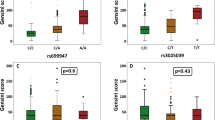Abstract
Tumor necrosis factor (TNF)-α has been implicated in pathophysiological processes in coronary artery disease (CAD). TNF receptor 2 is of particular interest in mediating such effects. The gene for this receptor (TNFRSF1B) has, moreover, been implicated in hypertension, elevated cholesterol and insulin resistance. TNFRSF1B is thus a worthy candidate in studies of the genetic basis of CAD. We therefore conducted a case-control study of a microsatellite marker with five alleles (CA13-CA17) in intron 4 of TNFRSF1B in 1006 well-characterized white patients with angiographically confirmed CAD and a control group of 183 healthy subjects. We found a strong association of the TNFRSF1B marker with CAD (χ2=40, P=0.00000069). The frequency of the CA16 allele was 33% in CAD vs. 21% in control (odds ratio, OR, to have CAD for presence vs. absence of CA16 allele in CA16 homozygotes was 4.5, 95% CI 2.1–9.4, P<0.0001; in CA16 heterozygotes or was 1.3, 95% CI 0.94–1.89, P=0.10). The frequency of the major allele (CA15) was 43% in CAD vs. 56% in controls (in CA15 homozygotes OR 0.33, 95% CI 0.20–0.52, P<0.0001; in heterozygotes OR 0.41, 95% CI 0.26–0.63, P<0.0001). In a stepwise logistic regression model the CA16 allele was significantly associated with overweight (OR 1.44, 95% CI 1.0–1.9, P=0.027). Apolipoprotein A-I was elevated (P<0.0001), as was high-density lipoprotein (P=0.098), and severity of angina was decreased (P=0.024) as a function of genotype. Plasma soluble (s) TNF-R2 was 5.1±0.1 ng/ml in CAD vs. 3.2±0.1 in control (P<0.0001), 5.2±0.1 in the presence vs. 4.6±0.2 in the absence of vessel disease (P=0.009), and rose with increasing severity of angina: 4.2±0.2 (no angina), 5.0±0.1 (stable angina), 5.4±0.2 (unstable angina; P=0.003). sTNF-R2 was correlated with age, cholesterol, creatinine, fibrinogen, transforming growth factor β and homocysteine and was influenced by TNFRSF1B genotype. Thus genetic variation in or near the TNFRSF1B locus may predispose to CAD.
Similar content being viewed by others
Author information
Authors and Affiliations
Additional information
Electronic Publication
Rights and permissions
About this article
Cite this article
Benjafield, A., Wang, X. & Morris, B. Tumor necrosis factor receptor 2 gene (TNFRSF1B) in genetic basis of coronary artery disease. J Mol Med 79, 109–115 (2001). https://doi.org/10.1007/s001090000168
Received:
Accepted:
Published:
Issue Date:
DOI: https://doi.org/10.1007/s001090000168




